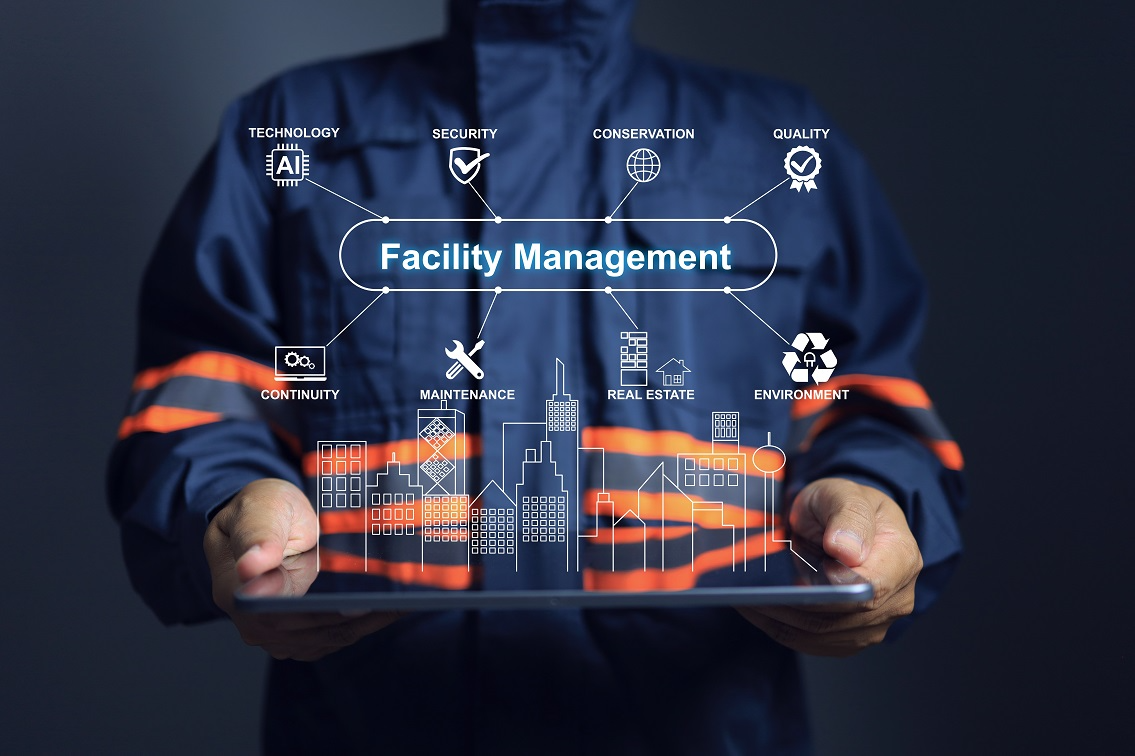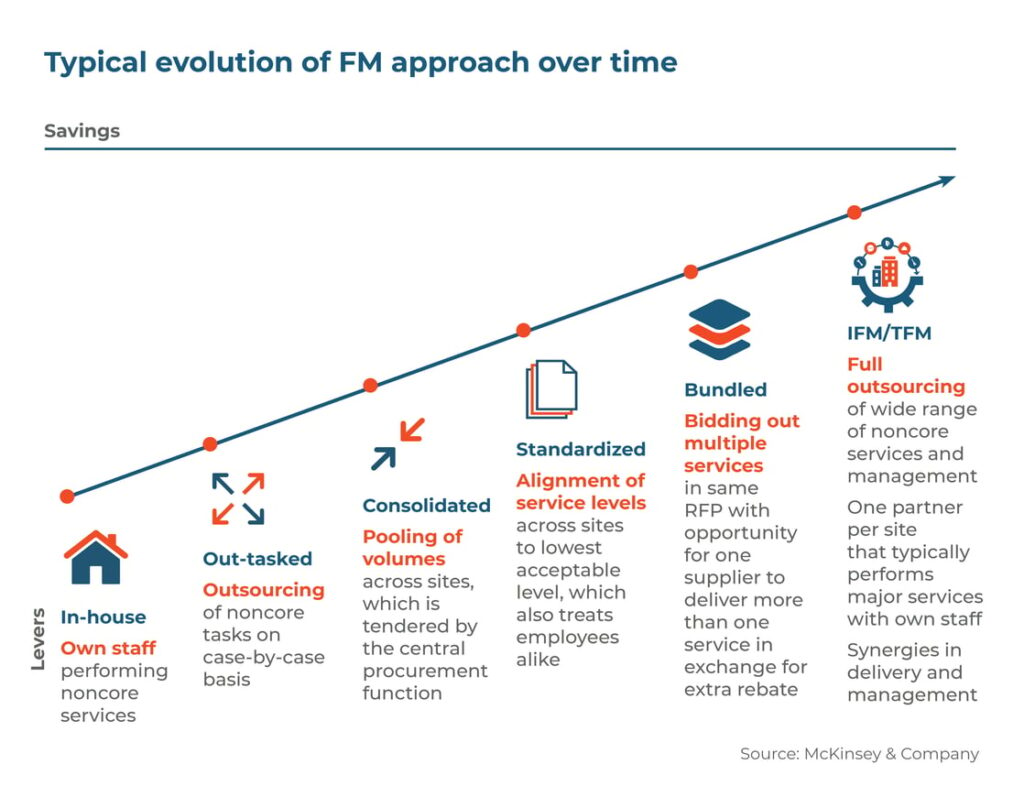How Total Facility Management Enhances Workplace Efficiency and Business Outcomes
How Total Facility Management Enhances Workplace Efficiency and Business Outcomes
Blog Article
Why Total Facility Management Is Important for Business Success
Total Facility Management (TFM) offers as a cornerstone for company success by balancing varied functional aspects such as maintenance, space usage, and security procedures. As organizations browse a competitive landscape, understanding the multifaceted benefits of TFM can be critical in driving expense effectiveness and enhancing worker efficiency.
Comprehending Total Facility Management
Total Facility Management (TFM) incorporates a thorough approach to managing a company's structures and linked solutions to make certain optimum capability, safety and security, and effectiveness. TFM incorporates different self-controls, including maintenance, procedures, room management, and security protocols, to create a natural structure that sustains an organization's core objectives.
At its core, TFM intends to simplify the procedures included in facility management, improving and minimizing redundancies solution delivery. This strategy entails the control of tasks connected to residential property management, such as repairs, cleansing, and energy management, to cultivate an efficient environment for staff members and stakeholders alike. TFM also stresses the value of executing best methods and innovative modern technologies to enhance service top quality and decrease functional expenses.
Understanding TFM calls for recognition of its critical relevance in supporting an organization's mission. By lining up facility management tasks with organizational objectives, TFM enhances overall performance while ensuring compliance with health, safety and security, and environmental guidelines. Thus, TFM offers not just as a logistical function yet also as a calculated asset, adding to a company's long-term sustainability and development. In recap, TFM is important for developing a well-functioning environment favorable to organization success.
Trick Advantages of TFM
Leveraging a comprehensive method, organizations that carry out Total Facility Management (TFM) unlock a myriad of advantages that add to total business success. One of the primary advantages of TFM is the enhancement of operational effectiveness. By combining facility solutions under a unified management framework, companies can enhance procedures, minimize redundancies, and boost interaction throughout divisions.
Additionally, TFM advertises an aggressive upkeep method, which lessens downtime and expands the life-span of facilitiess and devices (Total Facility Management). This positive method not only enhances productivity but also cultivates a more secure working setting, eventually causing higher employee fulfillment and retention rates
Additionally, TFM promotes far better source allotment by offering insights right into facility performance metrics. Organizations can recognize locations for enhancement, allowing them to make enlightened choices that line up with their strategic objectives.
TFM and Expense Efficiency
Attaining expense efficiency is a basic objective for organizations, and Total Facility Management (TFM) plays an essential function in this undertaking - Total Facility Management. By incorporating various facility services under a solitary management framework, TFM allows organizations to streamline procedures and minimize redundancies. This alternative approach brings about considerable cost financial savings, as it eliminates the demand for several suppliers and simplifies purchase processes
In addition, TFM promotes aggressive maintenance approaches, which lessen the risk of expensive repairs and downtime. By prioritizing safety nets, companies can prolong the life-span of their assets and minimize unexpected expenditures. In addition, TFM incorporates power management practices, which can drastically cut energy costs with reliable source usage.
The centralization of information and analytics within TFM permits organizations to make educated economic choices. By identifying patterns and locations for improvement, TFM allows customized approaches that further improve expense management. Furthermore, the scalability of TFM services makes sure that as companies expand, their facility management practices stay effective and lined up with economic objectives.
Enhancing Staff Member Productivity
A well-managed facility can significantly boost employee productivity by creating a favorable workplace. Reliable Total Facility Management (TFM) makes sure that all elements of the work environment-- from illumination and temperature to tidiness and safety-- are optimized. When employees operate in a space that is comfy and properly maintained, they are a lot more most likely to focus on their tasks, resulting in greater result and task fulfillment.
Furthermore, TFM can enhance collaboration via the critical layout of common areas, urging synergy and advancement. By buying the right sources and innovation, organizations can facilitate smooth interaction and improve workflows, better improving productivity. Normal maintenance and prompt feedbacks to facility Related Site issues protect against interruptions that could or else hinder efficiency.
Furthermore, a safe and healthy and balanced work setting, supported by TFM practices, minimizes absenteeism and advertises well-being, straight correlating with raised efficiency degrees. Eventually, focusing on facility management is an investment not only in physical properties however additionally in the workforce itself. By cultivating an atmosphere that sustains employee requirements and preferences, services can grow a more involved and efficient workforce, driving total success and competitive benefit.

Future Trends in TFM
Accepting technical developments is set resource to improve the landscape of Total Facility Management (TFM) in the coming years. As the need for efficiency and sustainability increases, TFM will significantly take on wise structure innovations, integrating Net of Things (IoT) tools to take care of and keep an eye on facility operations in real-time. This change will make it possible for proactive maintenance, significantly boosting and lowering functional expenses solution distribution.

Sustainability remains a crucial focus, with TFM specialists expected to focus on environmentally friendly practices. This consists of making use of eco-friendly energy sources and enhancing waste management systems to decrease the carbon impact of facilitiess.
Remote management capacities will additionally be increased, allowing facility managers to supervise operations from basically anywhere. This flexibility will certainly come to be crucial as organizations adjust to crossbreed work designs. In summary, the future of TFM is poised for improvement through technology, sustainability, and boosted operational techniques, ensuring businesses continue to be affordable in an advancing landscape.
Conclusion
By incorporating different functional functions, TFM improves efficiency and straightens facility management with organizational purposes. As companies increasingly adopt ingenious modern click to read more technologies and sustainable practices, the value of TFM will certainly proceed to expand, ensuring long-lasting operational effectiveness and competitiveness in a developing market.

Report this page